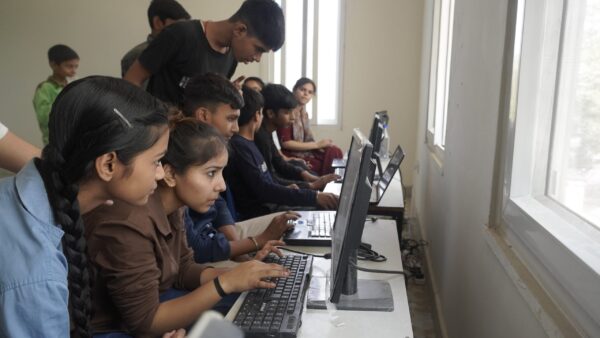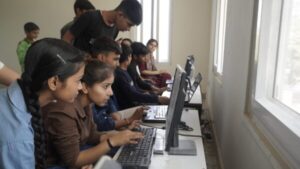Why Girl Education is Not Only a Moral Duty, But a Smart Investment

Why Girl Education is Not Only a Moral Duty, But a Smart Investment

Education is an inalienable human right, essential for every individual regardless of gender, race, religion, or any other societal classification. Regrettably, millions of girls worldwide still encounter formidable barriers obstructing their access to education, including poverty, discrimination, violence, early marriage, and inadequate resources. Such denial not only perpetuates moral injustice but also squanders opportunities for societal and economic advancement. Importance of girl education yields manifold benefits, enriching not only the lives of the girls themselves but also their families, communities, and nations. Below are compelling reasons elucidating why investing in girls’ education is astute:
Preservation of Lives:
Education for girls significantly diminishes maternal and child mortality rates while curbing the proliferation of diseases. Statistics from the Global Partnership for Education underscore that completing primary education could potentially save the lives of 190,000 mothers. Additionally, each additional year of schooling reduces infant mortality rates by 5% to 10%. Educated girls tend to access healthcare, family planning, and nutrition, thereby fostering healthier lifestyles for themselves and their offspring.
Economic Empowerment:
Some NGOs Educate girls command higher earning potential and expanded economic prospects, effectively combating poverty and inequality. Studies reveal that women with primary education earn up to 20% more than those devoid of any formal education. Furthermore, women attaining secondary or tertiary education can expect nearly double or triple the income, respectively, compared to their uneducated counterparts. Engaging in the labor force, entrepreneurial pursuits, and contributing to national economies are common trajectories for educated girls.
Combatting Child Marriage:
Educating girls serves as a potent deterrent against premature marriages, safeguarding their rights, health, and educational pursuits. The Center for Global Development asserts that universal secondary education attainment could virtually eradicate child marriages. Such unions not only deprive girls of autonomy but also pose grave risks to their children, who face heightened probabilities of prematurity, underweight births, and malnutrition.
Empowerment:
Education empowers girls by bolstering their agency, voice, and decision-making abilities, nurturing confidence and self-esteem. Studies spanning 54 nations indicate that women with secondary education are four times less likely to endure resource deprivation, domestic abuse, or early marriages, compared to those with only primary education. Educated girls assume active roles in shaping their lives, families, and communities, challenging detrimental norms and practices.
Improved Child Health:
Maternal education positively correlates with enhanced child health outcomes and educational achievements. Each additional year of maternal schooling, as outlined by the World Bank, reduces child mortality rates by 2%. Educated mothers exhibit higher propensities for immunizing their children, facilitating their school attendance, and supporting their academic endeavors. Consequently, children of educated mothers are more likely to thrive, exhibiting literacy, numeracy, and overall well-being.
These rationales exemplify the compelling case for investing in girls’ education as a strategic endeavor. By nurturing the educational aspirations of girls, we unlock their latent potential, fostering a more prosperous, harmonious, and sustainable global landscape. Echoing the sentiment of former UN Secretary-General Kofi Annan, “There is no tool for development more effective than the education of girls.” Let us fervently ensure that every girl receives the opportunity to learn, grow, and flourish.
FAQ
Q1: Why is girls’ education important?
A1: Girls’ education is crucial for numerous reasons. Not only does it uphold fundamental human rights, but it also contributes to improved health outcomes, economic empowerment, and social progress. Educating girls benefits not only the girls themselves but also their families, communities, and nations at large.
Q2: How does educating girls impact society?
A2: Educating girls leads to a myriad of positive societal impacts. It helps break the cycle of poverty by enhancing economic opportunities and reducing inequality. Additionally, educated girls are more likely to make informed decisions about their health, contribute to their communities, and challenge harmful social norms.
Q3: What are the barriers to girls’ education?
A3: Various barriers impede girls’ access to education, including poverty, cultural norms, lack of infrastructure, early marriage, gender-based violence, and inadequate resources. Addressing these barriers requires comprehensive efforts encompassing policy changes, community engagement, and investment in education infrastructure.
Q4: How does girls’ education contribute to economic development?
A4: Girls’ education is a catalyst for economic growth and development. Educated girls tend to earn higher incomes, contribute to household and national economies, and participate more actively in the labor force. Moreover, investing in girls’ education yields substantial returns, boosting productivity and fostering innovation.
Q5: What are the long-term benefits of investing in girls’ education?
A5: Investing in girls’ education yields long-term benefits that extend beyond individual success. It promotes gender equality, strengthens social cohesion, and fosters sustainable development. Educated women are more likely to become agents of change, advocating for human rights, environmental conservation, and peacebuilding initiatives.

Leave a Reply